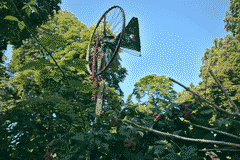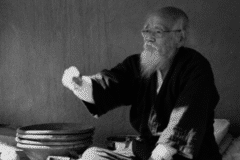A school of ecological systems thinking
"Permaculture is a philosophy of working with, rather than against nature; of protracted and thoughtful observation rather than protracted and thoughtless labor; and of looking at plants and animals in all their functions, rather than treating any area as a single product system."
- Bill Mollison
Permaculture originated as a form of sustainable agriculture. It developed into a larger set of values and priciples referencing a permanent culture, extending to architecture, tooling and general land management.
It takes inspiraton from arrangements found in flourishing natural ecosystems, emphasizing renewable resources, whole-systems thinking and a local-first approach.
Foundational Ethics
| Care of the Earth | Provision for all life systems to continue and multiply. |
| Care of People | Provision for people to access those resources necessary for their existence. |
| Limit Population and Consumption | By governing our own needs, we can set resources aside to further the above principles. |
Design Principles
| Observe & Interact | Take time to engage with nature to design solutions that suit a particular situation. |
| Catch & Store Energy | Develop systems that collect resources at peak abundance for use in times of need. |
| Obtain a Yield | Emphasize projects that generate meaningful rewards. |
| Apply Self-Regulation and Accept Feedback | Discourage inappropriate activity to ensure that systems function well. |
| Use and Value Renewable Resources and Services | Make the best of nature's abundance: reduce dependence and consumption on non-renewable resources. |
| Produce no Waste | Value and employ all available resources; waste nothing. |
| Design from patters to details | Observe patterns in nature and societe and use them to inform designs, later adding details. |
| Integrate Rather Than Segregate | Proper design allows development of relationships between elements, allowing them to work together to support each other. |
| Use Small and Slow Solutions | Small and slow systems are easier to maintain, make better use of local resources and produce more sustainable outcomes. |
| Use and Value Diversity | Diversity reduces system-level vulnerabilities that threaten to exploit their environment. |
| Use Edges and Value the Marginal | The border between things is where the most interesting events take place. These are often the system's most valuable, diverse and productive elements. |
| Creatively Use and Respond to Change | A positive impact on inevitable change comes from careful observation, followed by well-timed intervention. |
sustenance needs
- Clean Water: Water harvesting and long term storage
- Food: In-home organic food production capability
- Shelter: Building with natural and recycled materials
- Energy: Thermal and/or solar heating and cooling, solar and wind electricity
- Garbage management: Reuse and recycling built into construction and daily living
- Sewage treatment: Self-contained sewage treatment and water recycling
conviviality

fukuoka

solar punk

